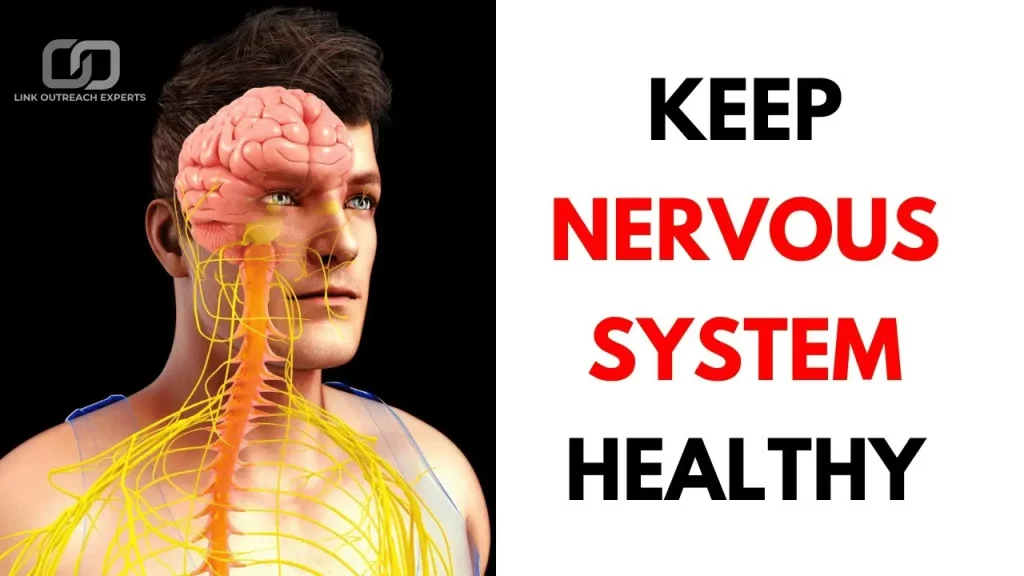The nervous system is made up of the brain, spinal cord, and nerves. It controls everything in your body, including movement, senses, and thoughts. It sends signals to and from the brain to help the body function. The nervous system also regulates processes like breathing and heart rate, which keep us alive.
Keeping the nervous system healthy is important for overall well-being. When it’s not working well, it can cause problems like memory loss, muscle weakness, and trouble moving. Poor nervous system health can also affect mood and cause stress or anxiety. Taking care of it helps maintain a strong mind and body, which is essential for a happy and active life.
Table of Contents
Importance of Nervous System Health
The nervous system is responsible for controlling and coordinating everything in your body. It manages essential functions like movement, breathing, heart rate, and even emotions. It allows the brain to communicate with the rest of the body, ensuring that every part of you works together smoothly. This system also plays a big role in how you think, feel, and process information.
When the nervous system is healthy, it supports all your activities and helps you stay physically and mentally sharp. It makes sure your muscles work properly and that you can respond quickly to different situations. A well-functioning nervous system also helps with memory, decision-making, and emotional stability, allowing you to live a balanced life.
However, if the nervous system isn’t functioning properly, it can lead to many health issues. You might experience problems like weakness, numbness, poor coordination, or even cognitive difficulties. It can also cause mental health issues like anxiety, depression, or difficulty concentrating. Your nervous system health also affects hair growth and scalp conditions.
Nutrition for a Healthy Nervous System
Nutrition plays a crucial role in maintaining a healthy nervous system. The brain and nerves rely on specific nutrients to function properly. These nutrients support the creation of neurotransmitters, which are responsible for transmitting signals between the brain and the body. Without the right nutrition, your nervous system may not perform at its best, affecting both physical and mental health.
Key Nutrients for Nerve Health
Several key nutrients are important for maintaining a healthy nervous system. B vitamins, found in foods like whole grains, eggs, and leafy greens, support nerve function and help reduce the risk of nerve damage. Omega-3 fatty acids, primarily found in fatty fish like salmon, are essential for brain health, helping with memory and cognitive function. Magnesium, found in nuts, seeds, and legumes, helps maintain proper nerve signaling and reduces muscle cramps and tension.
Foods to Include in Your Diet
Incorporating a variety of nutrient-rich foods into your diet can strengthen your nervous system. Leafy greens, whole grains, fatty fish, and seeds are all excellent sources of the vitamins and minerals that support nerve function. Regularly including these foods in your meals can provide essential nutrients like B vitamins, omega-3s, and magnesium, ensuring your nervous system stays healthy and well-supported.
Exercise and Physical Activity
Benefits of Regular Exercise for the Nervous System
Exercise is important for maintaining a healthy nervous system. Regular physical activity helps increase blood flow to the brain, which supports brain function and cognitive health. It also promotes the release of chemicals that improve mood and reduce stress. Exercise helps keep the brain sharp and supports the growth of new neurons, contributing to better memory and focus.
Recommended Exercises for Nervous System Health
Both aerobic exercises and strength training are beneficial for the nervous system. Aerobic exercises, like walking, running, or swimming, improve circulation and oxygen flow to the brain, enhancing cognitive function. Strength training, including weightlifting or resistance exercises, supports nerve function and helps with coordination and muscle strength. Regular physical activity of any type helps keep the nervous system in optimal condition.
How Exercise Improves Nerve Function
Exercise enhances nerve function by stimulating the release of neurotransmitters like serotonin and dopamine, which support mood and mental clarity. It also promotes the growth of new connections between neurons, improving brain plasticity. Regular activity helps prevent age-related cognitive decline and can improve response times, motor skills, and overall brain health.
Managing Stress
Effects of Stress on the Nervous System
Stress can have a negative impact on the nervous system. When you’re stressed, the body releases hormones like cortisol, which, in high levels, can damage nerve cells and affect brain function. Chronic stress can lead to anxiety, depression, and even physical problems like headaches or muscle tension. It can also interfere with sleep and memory, making it harder to focus and think clearly.
Effective Stress-Relief Techniques
Managing stress is crucial for keeping the nervous system healthy. Techniques like deep breathing, meditation, and mindfulness help calm the mind and reduce stress levels. Regular physical activity is another excellent stress reliever, as it promotes the release of endorphins that boost mood. Taking time to relax, engage in hobbies, or spend time with loved ones can also help lower stress and keep the nervous system balanced.
Importance of Relaxation and Mindfulness
Relaxation and mindfulness practices are powerful tools for reducing stress. Activities like yoga, progressive muscle relaxation, or simply taking time to focus on your breath can help lower stress hormones and promote relaxation. Being mindful of your thoughts and emotions also allows you to manage stress better, improving both mental and physical well-being.
Sleep and Rest for Nervous System Recovery
Sleep is essential for the nervous system to function properly. During sleep, the brain processes information, strengthens memory, and repairs nerve cells. Without enough sleep, the nervous system becomes overworked, leading to poor concentration, mood swings, and increased stress. Over time, lack of sleep can weaken nerve function, making it harder for the body to recover and perform daily tasks efficiently.
Rest is just as important as sleep for nervous system recovery. Taking short breaks throughout the day helps reduce mental fatigue and keeps the brain functioning at its best. Rest allows the nervous system to reset, improving focus, reducing stress, and preventing burnout. Simple activities like deep breathing, stretching, or quiet time can give the nervous system the relaxation it needs.
Good sleep habits are necessary for maintaining a healthy nervous system. Going to bed at the same time every night and avoiding screens before sleep can improve sleep quality. A dark, quiet, and comfortable sleep environment also helps the body and brain get proper rest.
Mental Stimulation and Cognitive Health
Keeping the brain active is essential for a healthy nervous system. Mental stimulation strengthens brain connections, improves memory, and enhances problem-solving skills. Activities like reading, learning new skills, or solving puzzles keep the brain engaged and prevent cognitive decline. When the brain is regularly challenged, it stays sharp and functions efficiently.
Cognitive health is closely linked to mental stimulation. Engaging in stimulating activities helps create new neural pathways, improving brain flexibility and response time. Social interactions, such as conversations or group activities, also play a role in keeping the mind active. A lack of mental stimulation can slow down brain function and increase the risk of memory loss over time.
To maintain cognitive health, it’s important to include brain-boosting activities in daily life. Playing strategy games, practicing a musical instrument, or even trying new hobbies can keep the brain active. Staying mentally engaged supports long-term nervous system health and overall well-being.
Natural Supplements for Nervous System Support
Certain natural supplements can help support the nervous system by providing essential nutrients. Supplements like B vitamins, magnesium, and omega-3 fatty acids play a key role in nerve function. B vitamins help improve nerve signaling, while magnesium supports relaxation and reduces nerve stress. Omega-3s, found in fish oil, promote brain health and improve cognitive function.
Herbal supplements can also benefit the nervous system. Adaptogens like ashwagandha and rhodiola help the body manage stress and protect nerve cells from damage. Herbal teas like chamomile and valerian root promote relaxation and better sleep, which are essential for nervous system recovery. These natural remedies can help reduce anxiety and support overall nerve health.
While supplements can be beneficial, they should be used wisely. It’s important to consult a healthcare professional before adding any new supplement to your routine. A balanced diet, along with the right supplements, can keep the nervous system strong and functioning properly.
Conclusion
Keeping your nervous system healthy is important for overall well-being. A good diet, regular exercise, and proper rest help your brain and nerves function properly. Managing stress and staying mentally active also support long-term nerve health. Small daily habits can make a big difference in keeping your nervous system strong.
Natural supplements and relaxation techniques can also provide extra support. Getting enough sleep, eating the right foods, and staying active will keep your nervous system in balance. Taking care of your nerves improves focus, memory, and energy levels.


